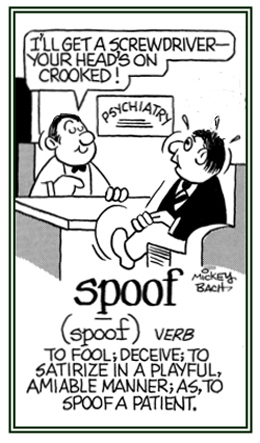You searched for:
“spoof”
spoof (verb), spoofs; spoofed; spoofing
1. To make fun of something while overemphasizing and magnifying its distinguishing aspects for humorous and witty results: To spoof someone or something is to produce a humorous imitation; such as, a film or a particular kind of film, in which its characteristic features are exaggerated for comic effect.
2. To play a trick on or to deceive someone or other people: Mark Twain once spoofed his friends by saying: "It usually takes more than three weeks to prepare a good impromptu speech."

© ALL rights are reserved.

© ALL rights are reserved.
Go to this Word A Day Revisited Index
2. To play a trick on or to deceive someone or other people: Mark Twain once spoofed his friends by saying: "It usually takes more than three weeks to prepare a good impromptu speech."
Jack was spoofing his fellow students about the contrary meanings of words that the teacher had assigned to them to learn; a few examples included the following:
- A tightrope walker is a well-balanced person who always takes the straight and narrow path.
- A toaster is a kitchen appliance that rings a bell when the toast is done or sends up smoke signals.
- Travel is a form of education that broadens the mind, flattens the wallet, and lengthens the conversation.
- A train is the only thing whose tracks people can see even before it has passed by.


Go to this Word A Day Revisited Index
so you can see more of Mickey Bach's cartoons.
This entry is located in the following unit:
English Words in Action, Group S
(page 11)
